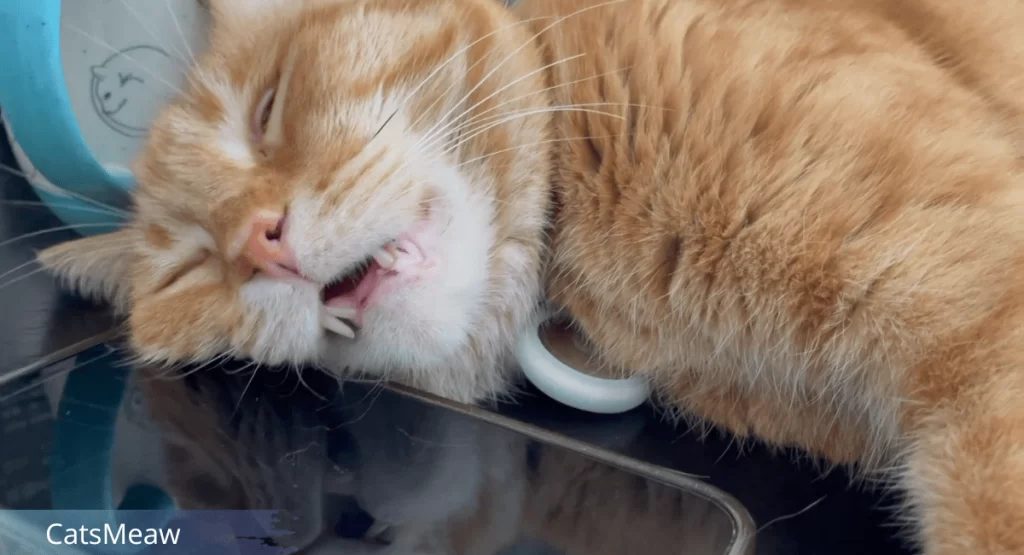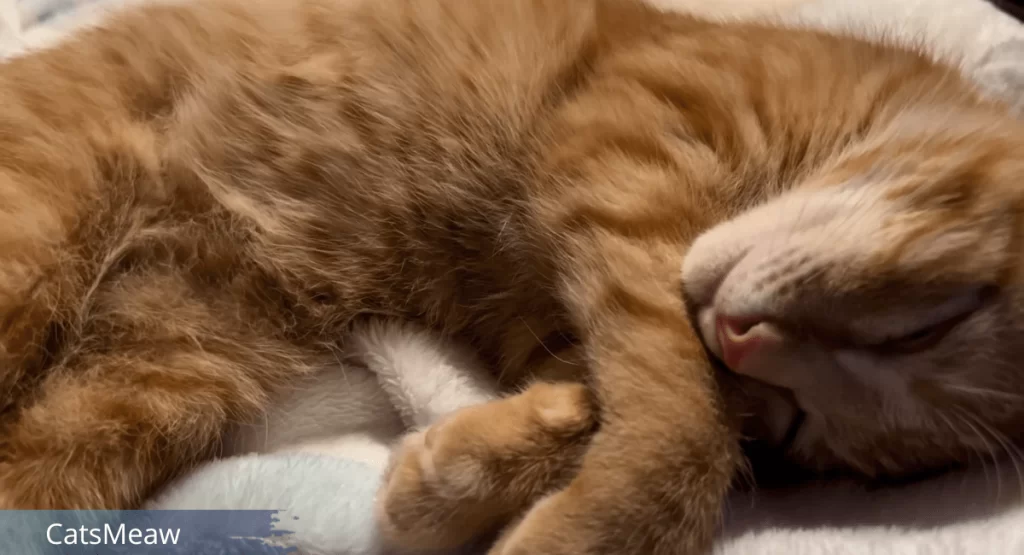Cats are fascinating creatures, known for their unique personalities and quirky behaviors. One behavior that often puzzles cat owners is when their feline friend twitches during sleep.
If you’ve ever watched your cat twitch, jerk, or make sudden movements while snoozing, you may have wondered what’s going on. Is it normal? Should you be concerned? This article delves into the science behind cat twitching in sleep, what it means, and when it might indicate a problem.

Table of Contents
Introduction
Sleep is vital for cats, just as it is for humans. On average, cats sleep between 12 to 16 hours a day, and much of this time is spent in deep sleep, where twitching is most likely to occur. But why do cats twitch in their sleep? This article will explore the different reasons behind this behavior, how to distinguish between normal and abnormal twitching, and what you can do to ensure your cat enjoys a comfortable and restful sleep.
The Science Behind Cat Twitching in Sleep
To understand why cats twitch during sleep, it’s essential to understand the different stages of sleep they go through. Like humans, cats experience several sleep stages, each with unique characteristics.
- Light Sleep: This is the first stage of sleep, where the cat is still somewhat aware of its surroundings. They may quickly wake up if disturbed.
- Deep Sleep: During this stage, the cat’s body relaxes, and its breathing slows. The brain activity decreases, and this is when the most restorative sleep occurs.
- REM Sleep (Rapid Eye Movement): This is the stage where twitching is most likely to occur. REM sleep is the stage associated with dreaming. During REM sleep, the brain is highly active, and you might notice your cat’s eyes moving under their eyelids, their paws twitching, or their whiskers quivering. This is because cats, like humans, experience dreams during REM sleep, and their bodies may react to these dreams through physical movements.
Related: Cat Food for Cats with Allergies
Common Causes of Cat Twitching in Sleep
Twitching during sleep is a common behavior in cats and is usually nothing to worry about. Here are some of the most common causes of cat twitching in sleep:
- Dreaming: As mentioned earlier, cats dream during REM sleep, and their bodies may respond to these dreams with small movements like twitching. They could be dreaming about chasing a mouse, playing with a toy, or even recalling a memory from earlier in the day.
- Muscle Spasms: Just like humans, cats can experience muscle spasms during sleep. These involuntary contractions of muscles can cause twitching, and they are usually harmless.
- Nervous System Activity: The cat’s nervous system is still active during sleep, and this can sometimes result in twitching. This is particularly true during REM sleep when the brain is highly active.
- Restorative Sleep: During deep sleep, the body undergoes repair and rejuvenation. This process can sometimes cause small muscle movements or twitches.
When to Be Concerned About Cat Twitching in Sleep
While twitching during sleep is usually normal, there are instances when it may indicate a problem. Here’s how to identify when twitching is abnormal and what to do about it.
- Prolonged Twitching: If your cat is twitching continuously for an extended period or seems unable to wake up from a twitching episode, it could be a sign of an underlying health issue.
- Severe Twitching or Shaking: Mild twitching is normal, but if the movements are severe or resemble shaking or convulsions, it could indicate a seizure. Seizures during sleep are a serious concern and require immediate veterinary attention.
- Changes in Behavior: If your cat is twitching in sleep suddenly and this behavior is accompanied by other changes, such as lethargy, loss of appetite, or changes in grooming habits, it may indicate an underlying health issue.
- Age-Related Issues: Older cats may develop neurological conditions that cause cat twitching in sleep. If your senior cat starts showing new or unusual twitching behaviors, it’s worth discussing with your veterinarian.
- Pain or Discomfort: If your cat is experiencing pain or discomfort due to conditions like arthritis, they may twitch or move restlessly during sleep. Pain management is essential in these cases.

How to Ensure a Comfortable Sleep Environment for Your Cat
Ensuring that your cat has a comfortable and safe sleep environment can help reduce unnecessary twitching and improve overall sleep quality. Here are some tips to create the ideal sleep environment for your cat:
- Provide a Cozy Sleeping Spot: Cats love to sleep in warm, comfortable places. Provide a soft, cushioned bed in a quiet, draft-free area of your home. Ensure that the bed is large enough for your cat to stretch out but snug enough to make them feel secure.
- Maintain a Consistent Sleep Schedule: Cats are creatures of habit and thrive on routine. Try to maintain a consistent schedule for feeding and playtime session, so your cat knows when it’s time to wind down for sleep.
- Reduce Stress and Anxiety: Stress and anxiety can affect your cat’s sleep quality. If your cat is anxious, consider using calming aids like pheromone diffusers or providing a quiet, secure space where they can retreat.
- Monitor Your Cat’s Diet: A healthy diet can contribute to better sleep. If your cat has food allergies, it’s crucial to choose cat food for cats with allergies. Allergies can cause discomfort, leading to restlessness and twitching during sleep. Feeding your cat the right food can help alleviate these symptoms.
- Regular Veterinary Check-ups: Regular veterinary visits are essential to ensure your cat’s health and well-being. If you notice any changes in your cat’s sleep behavior, such as increased twitching or restlessness, it’s important to discuss these with your vet.
Related: 3 Signs of Tumor in Cats
FAQs About Cat Twitching in Sleep
Is Cat Twitching in Sleep Normal?
Yes, cat twitching in sleep is a normal behavior, especially during REM sleep when cats are dreaming. Most of the time, there’s no need to be concerned.
Can Cat Twitching Be a Sign of a Seizure?
In some cases, severe twitching or convulsions during sleep may indicate a seizure. If the movements are intense and accompanied by other symptoms, it’s essential to seek veterinary care immediately.
How Can I Help My Cat Sleep Better?
To help your cat sleep better, ensure they have a comfortable and secure sleeping environment. Consider feeding them cat food for cats with allergies if they have dietary sensitivities, as allergies can cause discomfort and restless sleep.
What Should I Do if My Cat’s Twitching Seems Abnormal?
If your cat’s twitching seems abnormal, is prolonged, or is accompanied by other concerning symptoms, contact your veterinarian. They can help determine if there is an underlying health issue that needs to be addressed.
Conclusion
Cat twitching in sleep is a common and usually harmless behavior that many cat owners observe. It’s often associated with the REM stage of sleep when cats are dreaming. However, if you notice any abnormal twitching, such as prolonged or severe movements, or if your cat’s behavior changes, it’s important to consult with a veterinarian. Ensuring your cat has a comfortable sleeping environment and feeding them the right cat food for cats with allergies can contribute to better sleep quality.
In summary, while cat twitching in sleep is typically nothing to worry about, being aware of the signs of abnormal behavior can help you take the necessary steps to ensure your cat’s health and well-being.
By providing a cozy sleeping space, maintaining a consistent routine, and addressing any dietary needs, such as feeding cat food for cats with allergies, you can help your feline friend enjoy restful and restorative sleep.
